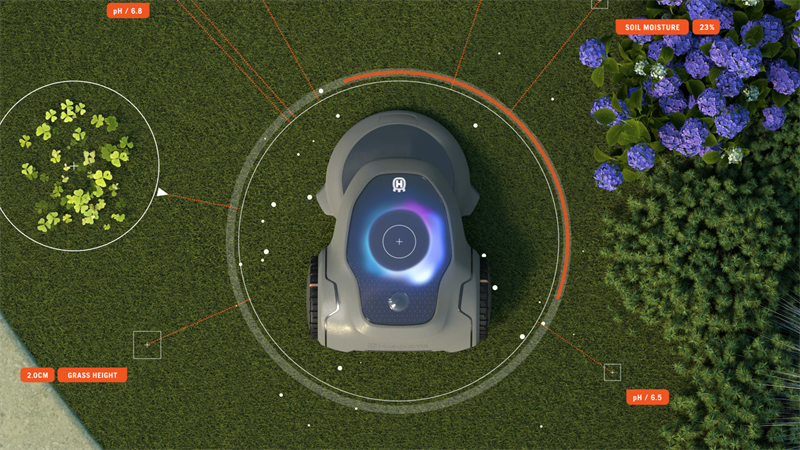Future vision for lawn care – the smart private gardener
From robotic lawn mower to smart private gardener – that is the vision when the Innovation Team of Husqvarna Forest & Garden, a division within Husqvarna Group, looks into the future of lawn care. The future robot is described as an AI-driven machine that protects your garden´s health and maximizes biodiversity, while seamlessly adapting to your personal needs. For the near future, Husqvarna also reveals the launch of a wire free solution for the consumer market in 2023.

More than 25 years ago, Husqvarna launched the world’s first robotic mower, later known as the Automower®, and changed the lawn mowing category forever. Today, the Automower® is smarter than ever before. In fact, next year Husqvarna is ready to launch its first wire free robotic mower for private gardens, also featuring improved object avoidance and terrain accessibility.
Emerging technologies like AI and cloud computing are expected to fuel innovation within the robotic lawn mowing category in the next ten years, and result in an even smarter, more automated and personal Atuomower® experience.
“In the future, we see that the robotic mower can help taking care of more parts of the garden, in addition to your lawn. For instance, the mower could advice on the general health of your garden, including bushes or trees, or what to plant to support insect pollinators. With technologies such as AI, it will be possible develop state-of-the-art sensors and cameras that can open up for these types of added benefits, says Patric Jägenstedt.
Full presentation of the “Future of Lawn Care”
Advice on biodiversity
Husqvarna also sees that new technology can enable the robotic mower to boost local biodiversity in urban gardens. Through increased data analysis capabilities from sources outside your garden – your neighbor’s mower, for instance – as well as utilizing sensors that measure key environmental components within the garden, the robotic mower can optimize mowing and give recommendations on how to best support biodiversity.
The future robot will maximize the potential of your garden, but also seamlessly adapt to your needs as a family. Through increased capabilities like an improved vision system and AI, the robot will learn to recognize reoccurring scenes, determine your behavior and adapt its behavior as a response. Based on the preferences of each family, it can learn to act socially or behave as a silent server.
The smart private gardener – innovation supporting the future vision
1. Your Smart Garden Supervisor
The future robotic lawn mower will use cloud computing and AI to simplify how you interact with your garden – managing your lawn and garden with minimal human interference. By interacting with other smart appliances and sensors around your house, for example watering systems, the mower can optimize the wellbeing of your lawn – just like a gardener. For example, it can quickly adapt its behavior to live data points – such as the weather forecast for the area. Also, by utilizing public data, the robot’s navigation capabilities will most likely extend to areas outside your garden. This makes it easier to cut in areas adjacent to your garden and even assist the neighbors in their lawn care if your robot has spare capacity.
2. Your Biodiversity Guardian
By supporting an approach to lawn care that views the entire garden as an ecosystem, your smart private gardener can help boost biodiversity. Through improved capabilities in data collection from sources inside and outside your garden, the future lawn mower could, for example, collect information from other robots in the neighborhood and provide you with insight into the overall composition of flora and fauna in the area. This, paired with data on where and how lifeforms in the garden create their habitat, makes the robotic mower equipped to optimize lawn care to best support the ecosystem.
3. Your Sociable Garden Companion
Through an improved vision system combined with cloud computing and AI, the robotic mower will be able to determine your behavior and adapt its own behavior as a response. For instance, it can adapt its level of social interaction depending on the owner’s preferences, keeping away when needed and playing or even acting as a pet if preferred. .Perhaps using your voice as opposed to the app to interact, the mower can, for example, advise on what nutrients to add when you're planting a new flower bed during spring by using its knowledge of your land and soil.
Husqvarna Group is a global leading producer of outdoor power products and innovative solutions for forest, park, garden care and the construction industry, transforming the way the world cares for outdoor environments. The Group is made up of three divisions: Husqvarna Forest & Garden, Husqvarna Construction and Gardena. Net sales in 2021 amounted to SEK 47bn and our global team consists of around 13 900 employees in 40 countries. Products include robotic lawn mowers for the professional and residential market, chainsaws, trimmers and ride-on mowers. The Group is also a global leader in residential watering and in cutting equipment and diamond tools for the construction and stone industries.
Comments (0)
This post does not have any comments. Be the first to leave a comment below.
Featured Product

